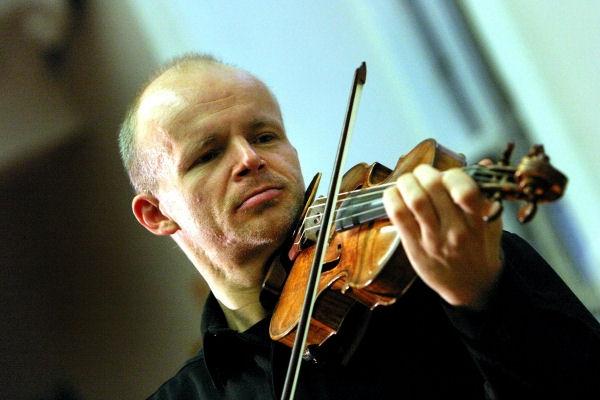Perhaps it was the effect of the elaborately mosaicked and marbled stage of the Wigmore Hall, but when a black-clad Thomas Zehetmair stepped out last night to occupy this space with just his violin and Bach for company, the image was incongruous. Even devotees of the hall will surely acknowledge the fussiness of its aesthetic appeal, the lingering visual excesses of a bygone age making it as unlikely a setting for Zehetmair’s deconstructed style as for the sharp architectural edges of Bach’s Sonatas and Partitas for Solo Violin. Yet host them it did, and in a characteristically uncompromising performance, Zehetmair managed to bring his comfortably sat audience along with him into an altogether less warm and secure place.
Danger is an overused word where Zehetmair is concerned, a catch-all for the swift speeds, rough textures and unorthodox articulation he favours. It’s also the wrong word. Although his choices may place at him at the edge of received technique, his playing remains comfortably within the margins of his own capacity. There is no danger here, just the illusion of it – a musical conjuring trick that gives Zehetmair his distinctive sound.
It’s an approach that works best in later repertoire, the buffer of lyric lines and a Romantic orchestra easing the impact of his unfinished edges. An evening of Bach’s Partitas in E major and D minor and his Sonata in C provided little by way of softening, allowing Zehetmair full control of the textures at work.
The opening Preludio to the Partita in E was a fair indication of things to come. Speedy (though not as fast as Zehetmair’s physical technique sometimes makes things appear) and firmly rooted in G-string rasp, there was real weight to the intent. This weight both anchored the rhythmic pulse of the movement, and kept the flightier moments above the stave from fully releasing, gripping them just a little too urgently. This weight persisted into the Loure that followed, but was framed here within a simplicity of delivery that highlighted both Zehetmair’s precise approach to phrasing and his occasionally wayward tuning. This latter seems the element willingly sacrificed by a violinist for whom tidiness is not a prime concern, rating beneath both directness and drama in his priorities. Even his 2007 recording of these works reflects this, honest in its imperfections of tuning and occasional blots of bowing colour.
Whereas the more straightforwardly beautiful renditions of Hahn or Fischer allow the ear to settle into a single listening plane, Zehetmair’s interpretation comes in and out of focus, moving between slick, forward-placed quaver runs (as in the E-major Gavotte), to wispy and halting double-stopped gambits such as those of the C-major Adagio. It’s not comfortable listening, nor does he seem to intend it to be. His Bach is about strife and suffering, refusing the easy consolations of melody or technical facility.
Discontinuities are a fascination of his delivery; thresholds, transitional passages all find unusual shape in Zehetmair’s gaze. It’s an approach that feels unduly constrained by the vertical formalities of the great C-major Fuga, but which yielded a mighty Ciaccona in the D-minor Partita, relishing its technical and harmonic trials with the staunchness of a Quixote, moving from adventure to adventure freshly undaunted.
Zehetmair’s rough intellectualism is an unusual force. It’s hard to be less than entirely conscious and involved during his performances, attention drawn and drawn again by the choices at work in his carefully carefree delivery. It’s an approach to admire and enjoy, but I have yet to be moved by it. Even a movement like the C-major Largo, fretfully vulnerable and urgent, becomes under Zehetmair’s deeply bowed touch more of a declamation, leaving little room for the silent dialogue of the listener.
- See what's on at the Wigmore Hall this season
- Find Thomas Zehetmair on Amazon













Add comment